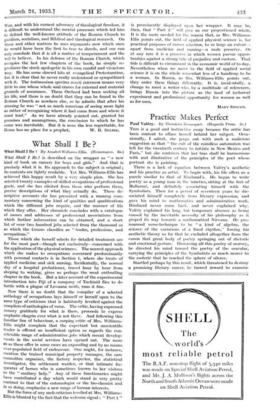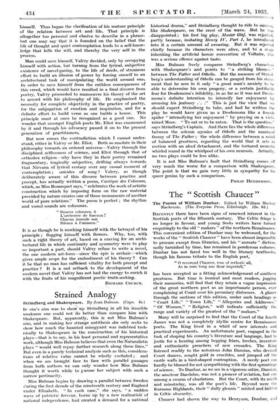Practice Makes Perfect
Paul Valery. By Theodora Besanquet. (Hogarth Press. Os.) Pius is a good and instructive essay because the critic has been content to efface herself behind her subject. Occa- sionally, I admit, she peeps out with such a malicious suggestion as that "the cult of the mindless automaton was left for the twentieth century to initiate in New Mexico and Paris," but she contrives that her bias shall be harmonious with and illustrative of the principles of the poet whose portrait she is painting.
There is a lack of equation between Val6ry's aesthetic and his practice as artist. To begin with, his life offers us a puzzle similar to that of Rimbaud's. He began to write poetry as a young man in the 'nineties, sitting at the feet of Mallarme, and definitely associating himself with the Symbolists. Then for a period of seventeen years he dis- sociated himself .completely from literary expression, and gave his mind to mathematics and administrative work. Rimbaud never came back, and never explained why. Valery explained his long, but temporary absence as being caused by the inevitable necessity of his philosophy as it groped its way towards a mathematical Nirvana. Ilc pro- nounced verse-technique to be "a kind of algebra, the science of the variations of a fixed rhythm," forcing his aesthetic theory so far that lie excluded altogether from the canon that great body of poetry springing out of rhetoric and emotional gesture. Dismissing all this poetry of oratory, he directed his mind toward the poetry of the oracular, carrying the principles of the Symbolists so much nearer to the esoteric that he reached the sphere of silence.
Startled perhaps by this result, which threatened to destroy a promising literary career, he turned inward to examine himself. Thus began-the clarification of his mature principle of the Jelation between art and 'life. That principle is _altogether too personal and elusive to describe in a phrase, but one may say that it is founded on the belief that the life of thought and quiet contemplation leads to a self-know- ledge that kills the will, and thereby the very self in the process.
Man could save himself, Valery decided, only by occupying himself with action, but turning from the lyrical, subjective . existence of navel-gazing, to the life of deeds, of strenuous effort to build an illusion of power by forcing oneself to an architectural task of manipulating the world around one.
In order to save himself from the ruthless consequences of this creed, which would have resulted in a final divorce from poetry, Valery proceeded to manoeuvre his theory of the art . to accord with his philosophy of life. He emphasized the necessity for complete objectivity in the practice of poetry, for the subjugation of emotion and inspiration, and for a definite effort to build verse as one builds a house. This principle must at once be recognized as a good one. No wonder that amongst English poets Mr. Eliot was enamoured by it and through his advocacy passed it on to the present generation of practitioners.
But now comes the contradiction which I cannot under- stand, either in Valery or Mr. Eliot. Both so resolute in their philosophy towards an ordered universe—Valery through the disciplined selflessness of science, and Eliot through that of orthodox religion—why have they in their poetry remained -fragmentary, tragically subjective, drifting always towards that Nirvana of lyrical ecstasy over any casual moment of • contemplation ; suicides of song ? Valery, as though deliberately aware of this divorce between practice and
precept, has actually written a poem, Cantique des Colonnes, which, as Miss Bosanquet says, "celebrates the work of artistic
construction which by imposing form on the raw material provided by nature creates one of those monuments of another world of pure relations." The poem is perfect ; the rhythm and vowel sounds are columnar.
" Douces colonnes, 6 L'orchestre de fuseaux !
Chacun imrnole son Silence Punisson."
It is as though he is mocking himself with the betrayal of his principle ; flogging himself 'with flowers. 'Why, too, -with such a right theory of art; based on a craving for an archi-
tectural life in which continuity and symmetry were to play so important a part, should Valery refuse to write a novel,
the one modern art-form—since the epic is archaic—which gives ample scope for the embodiment of his theory ? Can it be that no man has suffibient vitality for both precept and practice ? It is a sad setback to the development of the modern novel that Valery has not had the energy to enrich it with the fruits of his magnificent poetic-truth-seeking.
RICHARD CHURCH.







































 Previous page
Previous page